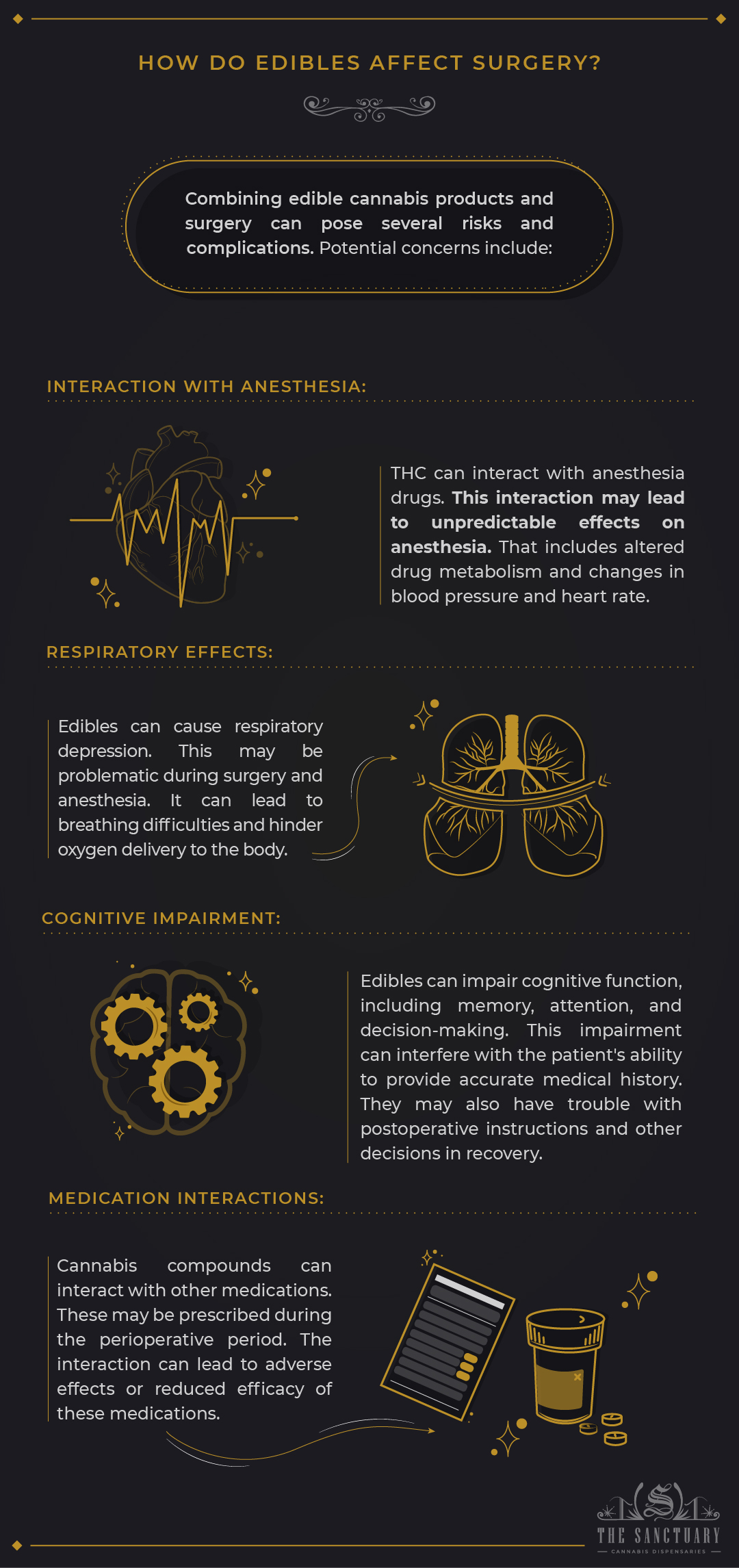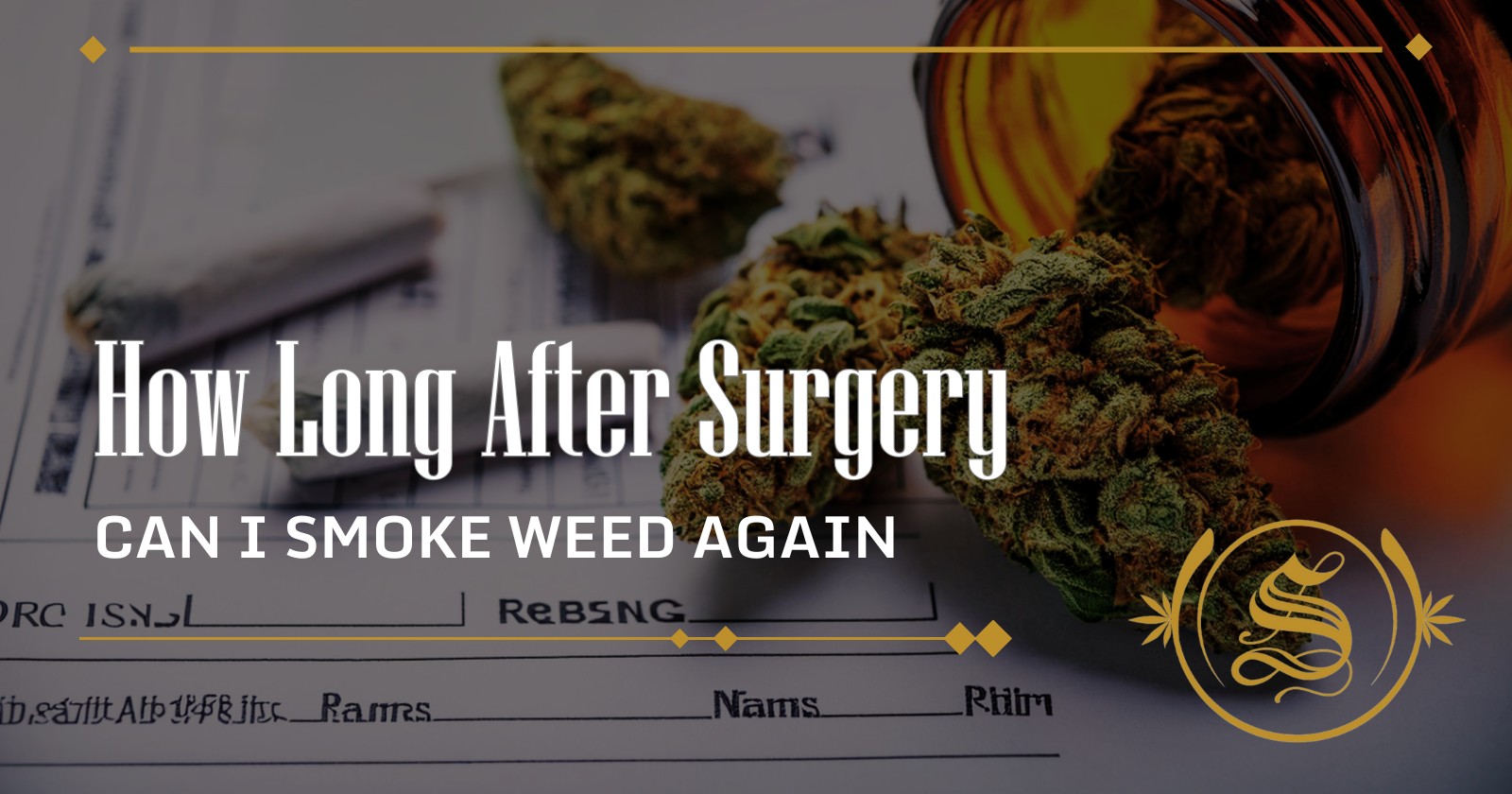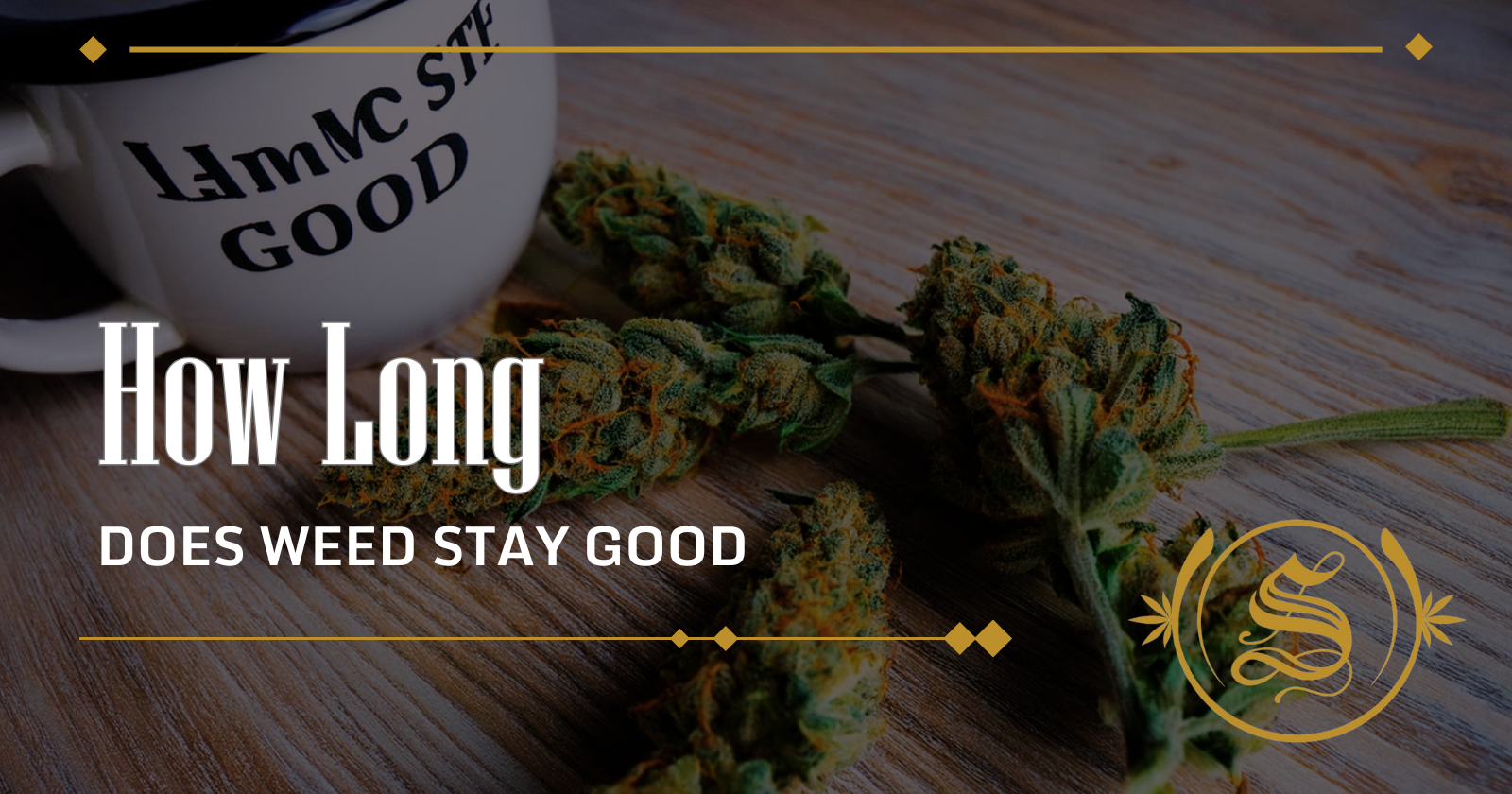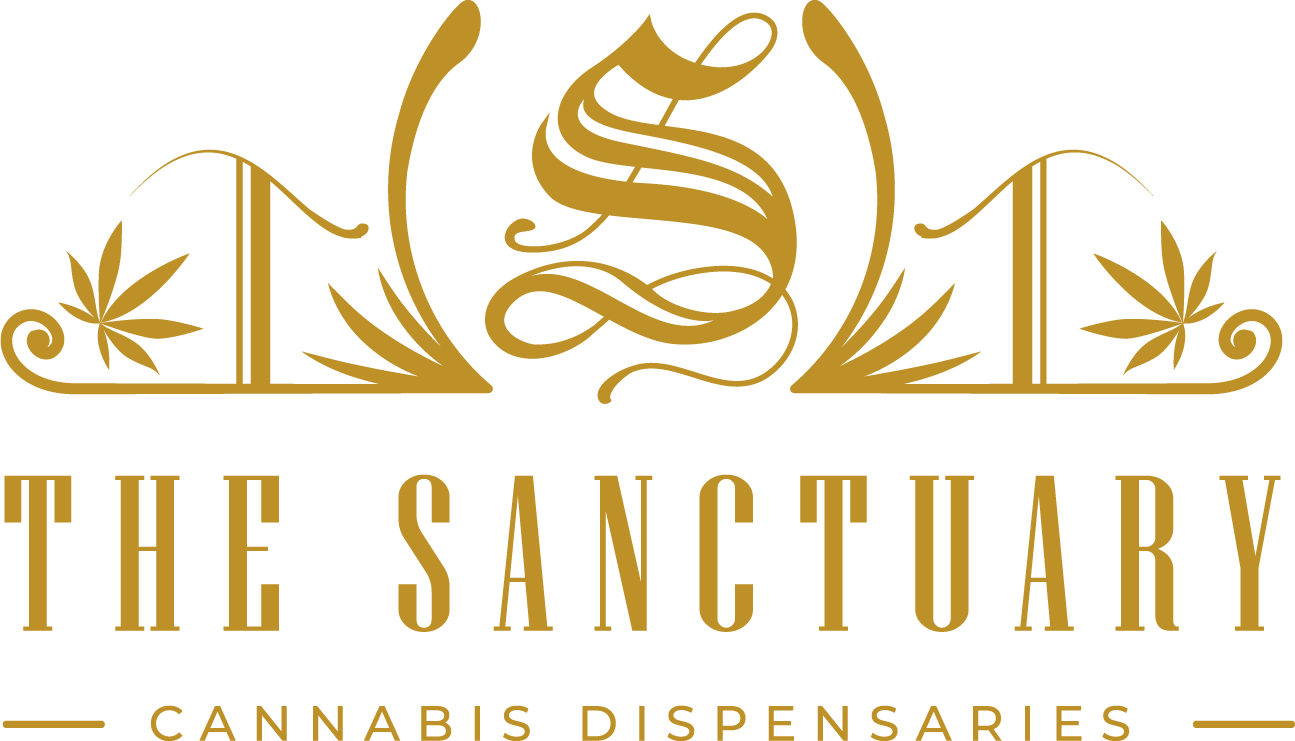Iftikhar Alam
Author
Reviewed by Cannabis Experts
Published on: June 28, 2023 | Updated on: September 11, 2024
The legalization of marijuana has caused many patients to think they don’t need to disclose their cannabis use to their surgeons. This reasoning is flawed and can increase the risk of surgical complications. Marijuana can affect your response to the anesthesia you may receive during surgery.
Such interactions can cause altered effects, respiratory issues, and cognitive impairment. Plus, edibles can have a stronger effect than other forms of cannabis consumption. So, it’s better to stop taking edibles about a week before surgery.
This is enough time to flush out all traces of cannabis from your system. Keep reading to discover how edibles affect surgery and why you should avoid them before surgery.
How Do Edibles Affect Surgery?

Combining edible cannabis products and surgery can pose several risks and complications. Potential concerns include:
- Interaction with Anesthesia: THC can interact with anesthesia drugs. This interaction may lead to unpredictable effects on anesthesia. That includes altered drug metabolism and changes in blood pressure and heart rate.
- Respiratory effects: Edibles can cause respiratory depression. This may be problematic during surgery and anesthesia. It can lead to breathing difficulties and hinder oxygen delivery to the body.
- Cognitive impairment: Edibles can impair cognitive function, including memory, attention, and decision-making. This impairment can interfere with the patient’s ability to provide accurate medical history. They may also have trouble with postoperative instructions and other decisions in recovery.
- Medication interactions: Cannabis compounds can interact with other medications. These may be prescribed during the perioperative period. The interaction can lead to adverse effects or reduced efficacy of these medications.
Also, THC can affect the metabolism of anesthesia drugs, leading to altered effects. The combination may increase certain side effects. That includes dizziness, confusion, and excessive sedation.
You must consult your doctor for personalized advice on surgery and specific edible products. They may recommend abstaining from edible consumption for a certain period before surgery. This will reduce the potential risks and ensure optimal anesthesia.
The recommended timeframe can range from a few days to several weeks. It depends on the potency of edibles consumed, individual metabolism, and overall health. Open communication with healthcare professionals will help determine the most appropriate duration.
How Many Days Before Surgery Should I Stop Taking Edibles?
The number of days before surgery you should stop taking edibles can vary. As a general guideline, it’s best to stop taking edibles at least a week before surgery.
This time frame allows for the complete clearance of cannabis compounds from the body. It reduces the potential risks and interactions with anesthesia drugs. Still, consult your healthcare provider for personalized advice.
Here are some factors to remember when determining the ideal duration:
- Type and potency of edibles: Different edible products have varying levels of potency and duration of effects. Edibles with higher THC levels may take longer to clear from the body. The stronger the edible, the longer it may take for the cannabis compounds to metabolize.
- Frequency and duration of edible use: Regular and long-term use of edibles can accumulate THC in the body’s tissues. This may take more time to dissipate. Individuals who use edibles often may need more time to get rid of cannabis from their system.
- Individual metabolism: Metabolism varies among individuals. It affects how fast the body processes and eliminates substances. Your age, weight, and liver function can influence how fast cannabis compounds metabolize.
The presence of cannabis in the body can affect its response to the surgical procedure and the recovery process. It may hinder healing, increase postoperative complications, and prolong recovery.
It’s crucial to follow healthcare professionals and avoid edibles before surgery. Honest communication with your healthcare provider will ensure the best surgical outcome.
Pain Management Alternatives for Edibles Before Surgery
Your healthcare professional may recommend avoiding edibles to prevent drug interactions during surgery. Such interactions can alter drug metabolism and alter the effectiveness of anesthesia administration.
Additionally, edible consumption can accumulate THC in your body’s tissues. Your body would need at least a week to flush all cannabis components from your tissues before the surgery.
However, some patients use edibles for pain management instead of recreationally. As a result, they may find it more difficult to avoid edibles before surgery. In that case, here are some potential alternatives to consider:
- Non-opioid pain medications: Your healthcare provider may prescribe non-opioid pain medications. That includes acetaminophen (Tylenol) or nonsteroidal anti-inflammatory drugs (NSAIDs) like ibuprofen or naproxen. These medications can help manage pain and inflammation after surgery.
- Local anesthetics: Local anesthetics can numb specific areas before or during surgery. This can provide targeted pain relief without systemic effects.
- Regional anesthesia: Depending on the surgery, regional anesthesia techniques may be an option. That includes epidural or nerve blocks. These techniques numb specific regions providing effective pain relief during the procedure.
- Physical therapy: Physical therapy and rehab techniques can manage pain and promote recovery after surgery. Your healthcare provider may recommend exercises, stretches, and other therapeutic modalities. These will help reduce pain and improve mobility.
- Mind-body techniques: Such techniques can manage pain and reduce anxiety before surgery. That includes relaxation exercises, deep breathing, meditation, and guided imagery. These approaches focus on calming the mind and promoting a sense of well-being.
Edibles can affect the body’s response to surgery and the recovery process. Managing pain effectively during recovery can promote healing, mobility, and well-being. Alternative pain management techniques can help achieve this without the risks associated with edibles.
Still, you must discuss these alternative pain management options with your healthcare provider. They can evaluate your specific situation, consider your surgery, and provide solutions.
Conclusion
It’s best to stop taking edibles before surgery to reduce risks and complications. Combining edible cannabis products with surgery can lead to unpredictable effects on anesthesia. It can also cause respiratory issues, cognitive impairment, and medication interactions.
By avoiding edibles before surgery, you can enhance the effectiveness of anesthesia and ensure a smoother recovery. Prioritizing your health and following medical guidance will contribute to a successful surgery.
Sources
https://www.quora.com/How-many-days-before-surgery-should-I-stop-ingesting-edible-marijuana
The content provided on this blog is for informational purposes only and does not constitute medical, legal, or professional advice. Cannabis use is subject to local laws and regulations, which vary widely by jurisdiction. Always consult with a healthcare professional before starting any new treatment or altering an existing treatment regimen. The authors and publishers of this blog are not responsible for any actions taken based on the information provided herein. Use cannabis responsibly and in accordance with applicable laws. This blog is intended for adults aged 21 and over. The Sanctuary Dispensaries D186, D187.








